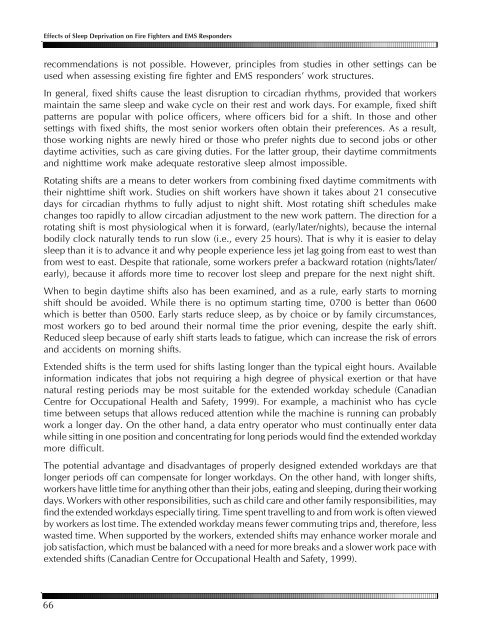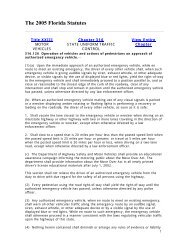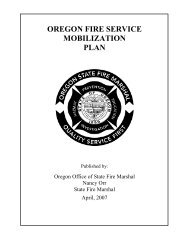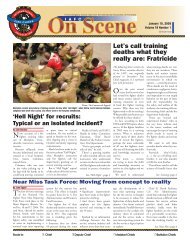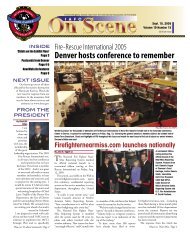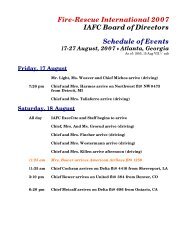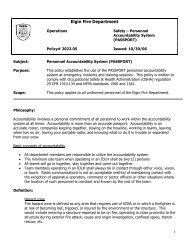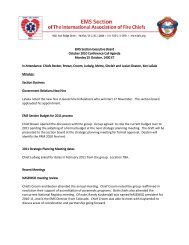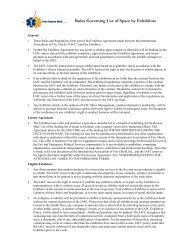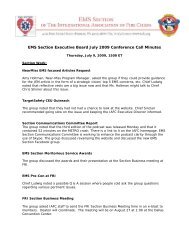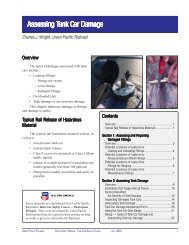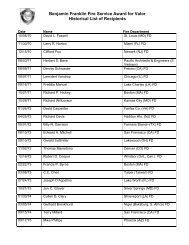Effects of Sleep Deprivation on Fire Fighters and EMS ... - NAEMT
Effects of Sleep Deprivation on Fire Fighters and EMS ... - NAEMT
Effects of Sleep Deprivation on Fire Fighters and EMS ... - NAEMT
Create successful ePaper yourself
Turn your PDF publications into a flip-book with our unique Google optimized e-Paper software.
<str<strong>on</strong>g>Effects</str<strong>on</strong>g> <str<strong>on</strong>g>of</str<strong>on</strong>g> <str<strong>on</strong>g>Sleep</str<strong>on</strong>g> <str<strong>on</strong>g>Deprivati<strong>on</strong></str<strong>on</strong>g> <strong>on</strong> <strong>Fire</strong> <strong>Fighters</strong> <strong>and</strong> <strong>EMS</strong> Resp<strong>on</strong>ders<br />
recommendati<strong>on</strong>s is not possible. However, principles from studies in other settings can be<br />
used when assessing existing fire fighter <strong>and</strong> <strong>EMS</strong> resp<strong>on</strong>ders’ work structures.<br />
In general, fixed shifts cause the least disrupti<strong>on</strong> to circadian rhythms, provided that workers<br />
maintain the same sleep <strong>and</strong> wake cycle <strong>on</strong> their rest <strong>and</strong> work days. For example, fixed shift<br />
patterns are popular with police <str<strong>on</strong>g>of</str<strong>on</strong>g>ficers, where <str<strong>on</strong>g>of</str<strong>on</strong>g>ficers bid for a shift. In those <strong>and</strong> other<br />
settings with fixed shifts, the most senior workers <str<strong>on</strong>g>of</str<strong>on</strong>g>ten obtain their preferences. As a result,<br />
those working nights are newly hired or those who prefer nights due to sec<strong>on</strong>d jobs or other<br />
daytime activities, such as care giving duties. For the latter group, their daytime commitments<br />
<strong>and</strong> nighttime work make adequate restorative sleep almost impossible.<br />
Rotating shifts are a means to deter workers from combining fixed daytime commitments with<br />
their nighttime shift work. Studies <strong>on</strong> shift workers have shown it takes about 21 c<strong>on</strong>secutive<br />
days for circadian rhythms to fully adjust to night shift. Most rotating shift schedules make<br />
changes too rapidly to allow circadian adjustment to the new work pattern. The directi<strong>on</strong> for a<br />
rotating shift is most physiological when it is forward, (early/later/nights), because the internal<br />
bodily clock naturally tends to run slow (i.e., every 25 hours). That is why it is easier to delay<br />
sleep than it is to advance it <strong>and</strong> why people experience less jet lag going from east to west than<br />
from west to east. Despite that rati<strong>on</strong>ale, some workers prefer a backward rotati<strong>on</strong> (nights/later/<br />
early), because it affords more time to recover lost sleep <strong>and</strong> prepare for the next night shift.<br />
When to begin daytime shifts also has been examined, <strong>and</strong> as a rule, early starts to morning<br />
shift should be avoided. While there is no optimum starting time, 0700 is better than 0600<br />
which is better than 0500. Early starts reduce sleep, as by choice or by family circumstances,<br />
most workers go to bed around their normal time the prior evening, despite the early shift.<br />
Reduced sleep because <str<strong>on</strong>g>of</str<strong>on</strong>g> early shift starts leads to fatigue, which can increase the risk <str<strong>on</strong>g>of</str<strong>on</strong>g> errors<br />
<strong>and</strong> accidents <strong>on</strong> morning shifts.<br />
Extended shifts is the term used for shifts lasting l<strong>on</strong>ger than the typical eight hours. Available<br />
informati<strong>on</strong> indicates that jobs not requiring a high degree <str<strong>on</strong>g>of</str<strong>on</strong>g> physical exerti<strong>on</strong> or that have<br />
natural resting periods may be most suitable for the extended workday schedule (Canadian<br />
Centre for Occupati<strong>on</strong>al Health <strong>and</strong> Safety, 1999). For example, a machinist who has cycle<br />
time between setups that allows reduced attenti<strong>on</strong> while the machine is running can probably<br />
work a l<strong>on</strong>ger day. On the other h<strong>and</strong>, a data entry operator who must c<strong>on</strong>tinually enter data<br />
while sitting in <strong>on</strong>e positi<strong>on</strong> <strong>and</strong> c<strong>on</strong>centrating for l<strong>on</strong>g periods would find the extended workday<br />
more difficult.<br />
The potential advantage <strong>and</strong> disadvantages <str<strong>on</strong>g>of</str<strong>on</strong>g> properly designed extended workdays are that<br />
l<strong>on</strong>ger periods <str<strong>on</strong>g>of</str<strong>on</strong>g>f can compensate for l<strong>on</strong>ger workdays. On the other h<strong>and</strong>, with l<strong>on</strong>ger shifts,<br />
workers have little time for anything other than their jobs, eating <strong>and</strong> sleeping, during their working<br />
days. Workers with other resp<strong>on</strong>sibilities, such as child care <strong>and</strong> other family resp<strong>on</strong>sibilities, may<br />
find the extended workdays especially tiring. Time spent travelling to <strong>and</strong> from work is <str<strong>on</strong>g>of</str<strong>on</strong>g>ten viewed<br />
by workers as lost time. The extended workday means fewer commuting trips <strong>and</strong>, therefore, less<br />
wasted time. When supported by the workers, extended shifts may enhance worker morale <strong>and</strong><br />
job satisfacti<strong>on</strong>, which must be balanced with a need for more breaks <strong>and</strong> a slower work pace with<br />
extended shifts (Canadian Centre for Occupati<strong>on</strong>al Health <strong>and</strong> Safety, 1999).<br />
66


